Where Can I Find Sources?
In this section, we have gathered information about Philosophy archives, libraries, museums, and institutions in Bloomington and around the world.
Indiana University is home to world-renowned collections including those at Wells along with those held by the Lilly Library, Eskenazi Museum of Art, Archives of African American Music & Culture, Moving Image Archive, and more. Many of these repositories require an appointment, so be sure to contact a librarian or archivist before your visit. Along with physical collections, you also have access to primary sources though online databases and digital collections from libraries, museums, and archives around the world.

Photo: Herman B Wells Library. IU Libraries Website. The Wells Library is home to the Black Film Center & Archives, University Archives, Moving Image Archive, and more.
Explore Physical Collections
You can browse many of the collections held by IU's libraries or our many world-famous archives and book repositories. Reach out to the librarians and archivists at specific repositories to get assistance with your research and/or set up a visit. Below you will find information about physical collections and archives at Indiana University, Bloomington. Many of these will have collections relevant to Gender Studies Research:
| Repository | Who are they and what do they have? | How to access materials |
|---|---|---|
|
Archives of African American Music and Culture (AAAMC) |
Established in 1991, the AAAMC is a repository of materials covering a range of African American musical idioms and cultural expressions from the post-World War II era. The collections highlight popular, religious, and classical music, with genres ranging from blues and gospel to R&B and contemporary hip hop. The AAAMC also houses extensive materials related to the documentation of Black radio. |
Collections in Archives Online |
|
(ATM) |
The ATM is an audiovisual archive that documents music and culture from all over the world. With over 110,000 recordings, it is one of the largest university-based ethnographic sound archives in the United States. The core of the collection consists of more than 3,000 field collections–unique and irreplaceable recordings collected by anthropologists, ethnomusicologists, and others. Some of the holdings' strengths include Native American, African, and Latin American music and spoken word, and large collections of early jazz and blues 78s. | |
|
(BFCA) |
The BFCA is the only center in the world dedicated entirely to the collection, preservation, curation, and programming of Black film. Since its founding in 1981, the BFCA has been proud to highlight and celebrate the contributions to film art and history made by people of African diasporic descent, as well as document the shifting ways that race and racism have been presented onscreen. | |
|
(Online) |
The Collections website brings together a compilation of Indiana University’s most valuable resources across all campuses. Peruse the website to obtain greater visibility into the rich history of our human cultural and scientific achievements. | |
| Herman B Wells Library | Wells Library is the visual center of the multi-library system and primarily supports the disciplines of the humanities and social sciences. More than 4.6 million volumes are housed in the building. Especially noteworthy are collections supporting international and area studies, including ones developed in African Studies, Russian and East European Studies, Uralic and Altaic Studies, East Asian Studies, and West European Studies along with the extensive Folklore Collection. To find a book at Wells, locate its call number in IUCAT or talk to a Reference Librarian in the East Tower for assistance. | |
|
(IU Archives) |
The Indiana University Archives holds records related to students, faculty, alumni, and general culture or information about Indiana University. With an estimated 18,000 cubic feet of records and papers in all formats, the University Archives is the largest and most comprehensive source of information on the history and culture of Indiana University. Browse the collections online, or contact an archivist to find records related to your research or interests. | |
|
(IULMIA) |
The IULMIA is one of the world’s largest educational film and video collections. Containing more than 130,000 items spanning nearly 80 years of film production, the Archive also includes many rare and last-remaining copies of influential 20th-century films. Email iulmia@indiana.edu for an appointment. | |
| Kinsey Institute Library & Special Collections | Maintains a research collection of unrivaled scope with manuscripts, data, materials, and papers from some of the world’s most influential sex researchers. The archives include the papers of Masters & Johnson, John Money, Harry Benjamin, and Thomas N. Painter, as well as the institutional records of the Society for the Scientific Study of Sexuality, the Albert Ellis archives, and the EROS magazine collection. |
Search the repository in IUCAT Email libknsy@indiana.edu for assistance |
| Latin American Music Center & Archives | The Latin American Music Center collection is comprised of thousands of items and includes rare manuscripts, published scores, colonial music anthologies, sound recordings, books, dissertations, periodicals, microfilms, and miscellaneous documents such as letters and photographs. | |
| Lilly Library | The Lilly Library is IU's principal rare books, manuscripts, and special collections library. Visit the library anytime to view special exhibitions and items on permanent display such as the New Testament of the Gutenberg Bible and the Slocum Puzzle Collection. Admission is always free and the library is open to everyone. | |
|
William and Gayle Cook Music Library (Music Library) |
Cook Music Library supports musical performance, teaching, learning, and research at Indiana University, primarily in the Jacobs School of Music. The strengths of the collection include: 19th-century first or early editions of orchestral, chamber, and opera sources; extensive holdings of printed operas; theory treatises from the Renaissance to the late 19th century; Russian/Soviet music; early keyboard and violin primary source materials; Black and Latin American music collections. |
Archives Online
Many of IU's archival holdings are searchable through Archives Online. Collections include records from Indiana University repositories. You can search across all collections or search within an individual collection. Once you select a collection to view, click "Entire Document" on the left of the screen to view the entire inventory of the collection.
A "Finding Aid" assists you in locating something in a collection. The "Title" of the collection and the "Collection No."are listed in the first portion of the finding aid. The "Collection No." is the identification marker that allows you to request a collection, along with the specific box numbers. Make sure to use finding aids to help you locate which boxes have materials of interest, often you are not able to request access to an entire collection.
For assistance using Archives Online, check out these videos:
- Archives Online- Using Search Options (Indiana University)
- Archives Online- Parts of A Finding Aid (Indiana University)
Grey Literature & Ephemeral and Pre-Publication Sources
Sometimes, scholarship does not go on to become a scholarly text in the form of an article or book. Consider consulting alternative academic sources, such as conference proceedings, seminars, abstracts, and theses and dissertations, which will allow you to find not only relevant scholarly work within the field, but in many cases will be more current than traditionally published sources. Keep in mind that these sources often do not undergo the same level of review as peer-reviewed work.
Explore the Grey Literature section of IU's Systematic Reviews & Evidence Based Reviews Guide to learn more about these sources.
Conference proceedings
Conference proceedings are compilations of papers, research, and information presented at conferences. Proceedings are sometimes peer-reviewed and are often the first publication of research that later appears in a scholarly publication. Proceedings are more commonly encountered (via databases and other searching) in science and engineering fields than in the arts and humanities.
- When using OneSearch@IU, you can filter results by selecting "Conference Materials" underneath format. Many databases contain a conference proceedings/materials filter.
Government Documents
The Government Printing Office disseminates information issued by all three branches of the government to federal depository libraries (including IU Libraries). Additionally, government departments publish reports, data, statistics, white papers, consumer information, transcripts of hearings, and more. Some information published by government offices is technical and scientific.
- To learn more about and access these materials, check out the Government Information guide or contact our Government Information, Maps, and Microform Services department.
Theses & Dissertations
Theses and dissertations are the result of an individual student's research while in a graduate program. They are written under the guidance and review of an academic committee but are not considered "peer-reviewed" publications.
- When searching OneSearch@IU, you can filter results by selecting "Dissertations/Theses" under format.
- Explore the Finding Dissertations and Theses Guide to learn more.
- IUScholarWorks is a repository where anyone affiliated with IU can share their research openly so that it is available for anyone in the world to read. It’s important to remember that this includes graduate students! Graduate students can share papers, data, posters, and even their dissertation in IUScholarWorks.
Websites and Non-Academic Sources
You won't always want, need, or be required to exclusively rely on academic sources in your research. In these cases, it is important to understand their provenance and scope and carefully evaluate them before usage. For more on source evaluation, use the navigation menu to the left.
- Websites are constantly changing, and there are also times when they are removed for a variety of reasons. The Internet Archive's Wayback Machine is the largest archive of websites available online, dating back as far as 1996. Pages in the Wayback Machine archive are captured repeatedly over time, and many pages are available in hundreds or thousands of versions, with each version corresponding to the content of the page on different dates. You can also use this service to create snapshots on-demand, by entering a website into the "Save Page Now" address bar near the bottom of the page.
- If you are having trouble accessing a website, enter its address into ClickMinded’s Google cache search. This tool will show you the snapshot of the page Google took when it last crawled the page, which can complement the archived versions available through the Wayback Machine.
Collections and Archives in Bloomington
-
Sidney and Lois Eskenazi Museum of ArtWith a collection of more than 45,000 works of art, there are always new treasures for you to discover. You can request an appointment to see any of our off-display work—for research, to conduct a class session, or just because you’re interested!
-
Sidney and Lois Eskenazi Museum of Art Collections OnlineCollections Online is a resource that allows visitors from around the world to see a selection of the 45,000 objects+ in our permanent collection. You’ll find high-quality images, complete descriptions, and details about each artwork that you can’t find anywhere else! For information about these objects, or others in our permanent collection, please contact a curatorial staff member.
-
Kenneth R. Haslam Collection on Polyamory at the Kinsey Institute LibraryThe Kenneth R. Haslam, MD. collection consists of conference materials, internet resources, media coverage, and research articles, as well as Dr Haslam’s personal correspondence and papers originally delivered at poly-oriented meetings, sex research and sex therapy conferences.
-
Indiana Philosophical Association Digital ArchiveFormed in 1931, the IPA is the only professional organization for philosophers in the state of Indiana and is officially recognized as an "affiliated organization" by the Central Division of the American Philosophical Association. The IPA meets twice a year at institutions across Indiana and elects its officers every spring. The IPA has an extensive archives, dating back to its founding documents. Many of these materials are available here.
-
Indiana MemoryIndiana Memory is a collaborative effort to provide access to the wealth of primary sources in Indiana libraries, archives, museums, and other cultural institutions. It is a gateway to Indiana's history and culture found in digitized books, manuscripts, photographs, newspapers, maps, and other media. As a portal to the collections, Indiana Memory assists individuals to locate materials relevant to their interests and to better appreciate the connections between those materials.
-
Indiana University Archives Digital Collections: PhilosophyCollections in the Indiana University Archives related to philosophy.
-
Indiana University Archives Digital Collections: ReligionCollections in the Indiana University Archives related to religion.
Archives, Museums, Libraries, etc.
Sampling of research centers and other organizations devoted to the study of and sharing of resources regarding philosophy:
- Center for Bioethics: Established in 1985, the University of Minnesota's Center for Bioethics is a nationally prominent, yet locally focused, resource that conducts important research and provides educational programs and services to help students, professionals, policy makers, and the public confront the complex ethical issues emerging in health care and the life sciences.
- Center for Critical Thinking: The Center for Critical Thinking and Moral Critique conducts advanced research and disseminates information on critical thinking.
- Center for Dewey Studies: The Center for Dewey Studies is the home of ongoing publishing projects and research materials that focus on the life and work of the American philosopher and educator John Dewey.
- Center for Environmental Philosophy: The Center for Environmental Philosophy is a non-profit organization that supports a range of scholarly activities that explore philosophical aspects of environmental problems.
- Center for the Study of World Religion: The mission of the Center for the Study of World Religions at Harvard Divinity School is to advance interdisciplinary, international, and interreligious exchange, learning, and research on the world's religions.
- Centre for Professional Ethics: The Centre is an internationally known research institution with a reputation for excellence in applied philosophy, particularly in bioethics and global ethics.
- Centre for Research Ethics and Bioethics: An organization for researchers from various disciplines that aims to offer opportunities to study issues in research ethics, bioethics and other fields of applied ethics.
- Group in Logic and the Methodology of Science: The Group in Logic and the Methodology of Science is an interdepartmental agency at UC Berkeley which cooperates closely with the Department of Mathematics, the Department of Philosophy, and the Department of Electrical Engineering and Computer Sciences.
- Institute for the Advancement of Philosophy for Children: The Institute for the Advancement of Philosophy for Children provides curriculum materials and teacher support for engaging young people in philosophical inquiry.
- Institute of Art and Ideas: The Institute of Art and Ideas (IAI) is committed to fostering a progressive and vibrant intellectual culture in the UK. We are a charitable, not-for-profit organisation engaged in changing the current cultural landscape through the pursuit and promotion of big ideas, boundary-pushing thinkers and challenging debates.
- Metaphysics Research Lab: The Metaphysics Research Lab consists of a group of researchers located around the world collaborating with Edward N. Zalta on the axiomatic theory of abstract objects.
- Minnesota Center for Philosophy of Science: MCPS advances research and graduate training in the philosophy of science and related studies of science and technology. It brings together researchers from around the world through its visiting fellows program and conferences, and conducts collaborative research through its workshops.
- National Center for Education Statistics: The National Center for Education Statistics (NCES) is the primary federal entity for collecting and analyzing data related to education.
- Paris Institute for Critical Thinking: The Paris Institute for Critical Thinking (PICT) is a non-profit organization founded in 2018 and based in Paris, France. The Institute is devoted to scholarly teaching and research in the English language. Our main aim is to offer university-quality courses in the humanities and social sciences to participants outside the university.
- Philosophy Learning and Teaching Organization (PLATO): PLATO’s mission is to nurture young people’s curiosity, critical thinking, and desire to explore big questions, through philosophy and ethics programs for students, educators, and families.
- The Royal Institute of Philosophy: The Royal Institute of Philosophy is a charity dedicated to the advancement of philosophy in all its branches through the organization and promotion of teaching, discussion, and research of all things philosophical.
- The Humanities Center at the University of Rochester: As scholars in the humanities and humanistic social sciences at the University of Rochester, we examine human culture in its myriad forms: literature, language, media, philosophy, religion, history, anthropology, visual and performing arts, and much more. The Humanities Center is our interdisciplinary home base. It is both a planned physical space, eventually to be located in Rush Rhees Library, and a community of researchers committed to scholarly exchange and collaboration. We offer programs for faculty, students, and the public.
- W. Maurice Young Centre for Applied Ethics: The Centre's mission is to advance research and teaching of applied ethics, conceived as the application of normative methods to core issues in science and technology ethics and policy, organizational ethics, animal welfare, health, the environment, and research ethics.
Source: American Philosophical Association, Centers and Institutes
-
 University of Edinburgh Philosophy Archives
As befits one of the great centres of the European Enlightenment, Edinburgh University has a rich collection of philosophical archives, ranging from the 18th century to the present day.
University of Edinburgh Philosophy Archives
As befits one of the great centres of the European Enlightenment, Edinburgh University has a rich collection of philosophical archives, ranging from the 18th century to the present day. -
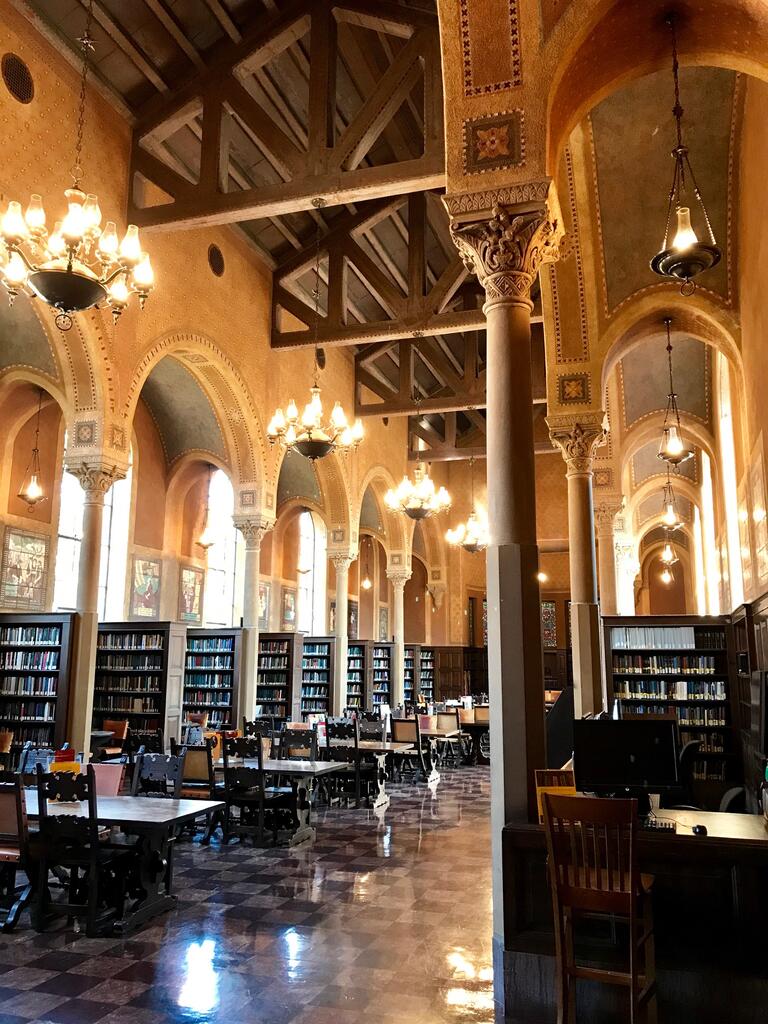 Hoose Library of Philosophy Archival Collections
The mission of the Hoose Library of Philosophy is to serve the educational and research needs of undergraduate and graduate students, faculty, and staff in all aspects of academic philosophy and its allied disciplines. The Hoose Philosophy Library offers in-depth research services during our normal hours of operation. Print reference sources are available in the library.
Hoose Library of Philosophy Archival Collections
The mission of the Hoose Library of Philosophy is to serve the educational and research needs of undergraduate and graduate students, faculty, and staff in all aspects of academic philosophy and its allied disciplines. The Hoose Philosophy Library offers in-depth research services during our normal hours of operation. Print reference sources are available in the library. -
 New York Public Library Philosophy Collection
The New York Public Library collects extensively in most areas of philosophy. The largest collection of philosophy is in the General Research Division (room 315). The General Research Division collects philosophy primarily in English, German, French, Italian, Spanish, and Portuguese. Translations of works originally written in English, however, are rarely acquired. Over 500 philosophy journals from around the world form an important part of the collection. An open-shelf browsing collection of major works and reference sources is available in the Rose Main Reading Room, Room 315, along the southwest wall. Items housed here are indicated in The catalog with a classmark that includes the prefix *R (e.g., *R-YAB). Holdings of works by and about Baruch Spinoza and Immanuel Kant are particularly strong. The Library has the first edition of Spinoza’s Tractatus theological-politicus (1670); the first (1781), third, fifth, and sixth editions of Kant’s Kritik der reinen Vernuft and a first edition of his Die Religion Innerhalb der Grenzin der blossen Vernuft (1793); also, a first edition of Descartes’ Discours de la methode (1637).
New York Public Library Philosophy Collection
The New York Public Library collects extensively in most areas of philosophy. The largest collection of philosophy is in the General Research Division (room 315). The General Research Division collects philosophy primarily in English, German, French, Italian, Spanish, and Portuguese. Translations of works originally written in English, however, are rarely acquired. Over 500 philosophy journals from around the world form an important part of the collection. An open-shelf browsing collection of major works and reference sources is available in the Rose Main Reading Room, Room 315, along the southwest wall. Items housed here are indicated in The catalog with a classmark that includes the prefix *R (e.g., *R-YAB). Holdings of works by and about Baruch Spinoza and Immanuel Kant are particularly strong. The Library has the first edition of Spinoza’s Tractatus theological-politicus (1670); the first (1781), third, fifth, and sixth editions of Kant’s Kritik der reinen Vernuft and a first edition of his Die Religion Innerhalb der Grenzin der blossen Vernuft (1793); also, a first edition of Descartes’ Discours de la methode (1637). -
 University of Pennsylvania World Philosophy Collection
Philosophy associated with major thought systems such as Confucianism, Buddhism and Islam are collected in English, European and Area specific languages. Both historically significant and contemporary works are purchased, as are Western interpretations and scholarship. World Philosophy extends beyond purely 'philosophical' material to include works in the fields such as Religious Studies and the History of Science.
University of Pennsylvania World Philosophy Collection
Philosophy associated with major thought systems such as Confucianism, Buddhism and Islam are collected in English, European and Area specific languages. Both historically significant and contemporary works are purchased, as are Western interpretations and scholarship. World Philosophy extends beyond purely 'philosophical' material to include works in the fields such as Religious Studies and the History of Science. -
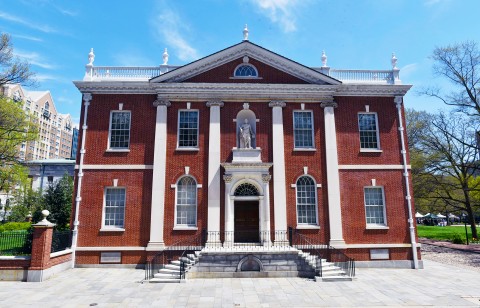 American Philosophical Association Library
With roots extending back to the founding of the Society in 1743, the Library of the American Philosophical Society houses over thirteen million manuscripts, 350,000 volumes and bound periodicals, 250,000 images, and thousands of hours of audio tape. The Library's holdings make it among the premier institutions for documenting the history of the American Revolution and Founding, the study of natural history in the 18th and 19th centuries, the study of evolution and genetics, quantum mechanics, and the development of cultural anthropology, among others.
American Philosophical Association Library
With roots extending back to the founding of the Society in 1743, the Library of the American Philosophical Society houses over thirteen million manuscripts, 350,000 volumes and bound periodicals, 250,000 images, and thousands of hours of audio tape. The Library's holdings make it among the premier institutions for documenting the history of the American Revolution and Founding, the study of natural history in the 18th and 19th centuries, the study of evolution and genetics, quantum mechanics, and the development of cultural anthropology, among others. -
Husserl Archives
We provide access to and transcription of Husserl’s manuscripts, make available other items of our collections (such as Husserl’s extensive correspondence and his complete philosophical library) as well as related historical documents, and provide research support for colleagues and students working on Husserl or within the field of phenomenology more broadly. If you are interested in the history of the Archives, want to take a closer look at the manuscripts, or be introduced to the spirit of Husserl’s phenomenology, we offer guided tours for visitors. You can visit the Husserl Archives in person in the President’s building of the Institute of Philosophy. In the ‘Husserlkamer’ visitors can learn about the life and work of Edmund Husserl, the suspenseful story of Pater van Breda’s rescue of Husserl’s philosophical estate, and about the history of the archives and its role in the phenomenological movement since its establishment in 1938. Husserl’s complete philosophical library is also on display in the Husserlkamer.
-
The Sophia Project
Founded in 1999 by college educators, the Sophia Project is an online collection of original articles, primary source texts, and commentaries in the fields of philosophy and ethics designed to provide the newcomer to the discipline of philosophy with the resources necessary to read great philosophical works. We believe that with the proper guidance almost any intelligent person can begin a life-long reading program in philosophy... and perhaps even become a bit wiser in the process. -
PhilArchives
PhilArchive is the largest open access e-print archive in philosophy. Formerly known as the PhilPapers Archive, it is built on and integrated with the PhilPapers database. Access to items on PhilArchive is free without a user account. PhilArchive is a non-profit project supported by the PhilPapers Foundation. -
Archives of Scientific Philosophy (University of Pittsburgh)
The Archives of Scientific Philosophy was founded in 1973 and preserves the papers of leading philosophers in the traditions of Logical Positivism, Logical Empiricism, as well as their intellectual heirs and critics. As the collection grows, it represents major trends of philosophy from the 20th century forward. -
 Philosophy Research Archives
The Philosophy Research Archives were established by the Philosophy Documentation Center, American Philosophical Association, and the Canadian Philosophical Association in 1975 as a solution to the space limitations of traditional print journals. Microfiche was the original format of publication and no limit was placed on the length of submissions. The concept was developed in cooperation with the American Council of Learned Societies and the Humanities Research Council of Canada. All volumes are now freely accessible.
Philosophy Research Archives
The Philosophy Research Archives were established by the Philosophy Documentation Center, American Philosophical Association, and the Canadian Philosophical Association in 1975 as a solution to the space limitations of traditional print journals. Microfiche was the original format of publication and no limit was placed on the length of submissions. The concept was developed in cooperation with the American Council of Learned Societies and the Humanities Research Council of Canada. All volumes are now freely accessible. -
Perseus Digital Library
Since planning began in 1985, the Perseus Digital Library Project has explored what happens when libraries move online. Two decades later, as new forms of publication emerge and millions of books become digital, this question is more pressing than ever. Perseus is a practical experiment in which we explore possibilities and challenges of digital collections in a networked world. Our flagship collection, under development since 1987, covers the history, literature and culture of the Greco-Roman world. We are applying what we have learned from Classics to other subjects within the humanities and beyond. We have studied many problems over the past two decades, but our current research centers on personalization: organizing what you see to meet your needs. -
American Philosophical Society Digital Library
The APS Digital Library provides access to a wide variety of digitized items from the holdings of the American Philosophical Society. Browse documents in the Digital Library by format on the Collections page, or find specific items using the search bar to the upper right. Many of the items in the Digital Library can be viewed with additional context by using our Collections Search, and viewing manuscript finding aids. -
 Rolston Digital Archives
Holmes Rolston, III is a philosopher and an Emeritus Professor of Philosophy at Colorado State University. He is best known for his contributions to environmental ethics and the relationship between science and religion. Among other honors, Rolston won the 2003 Templeton Prize, awarded by Prince Philip in Buckingham Palace. He gave the Gifford Lectures at the University of Edinburgh, 1997-1998. These digital collections include biographical materials, articles, book reviews, lectures, awards, and logs of trails and trips.
Rolston Digital Archives
Holmes Rolston, III is a philosopher and an Emeritus Professor of Philosophy at Colorado State University. He is best known for his contributions to environmental ethics and the relationship between science and religion. Among other honors, Rolston won the 2003 Templeton Prize, awarded by Prince Philip in Buckingham Palace. He gave the Gifford Lectures at the University of Edinburgh, 1997-1998. These digital collections include biographical materials, articles, book reviews, lectures, awards, and logs of trails and trips. -
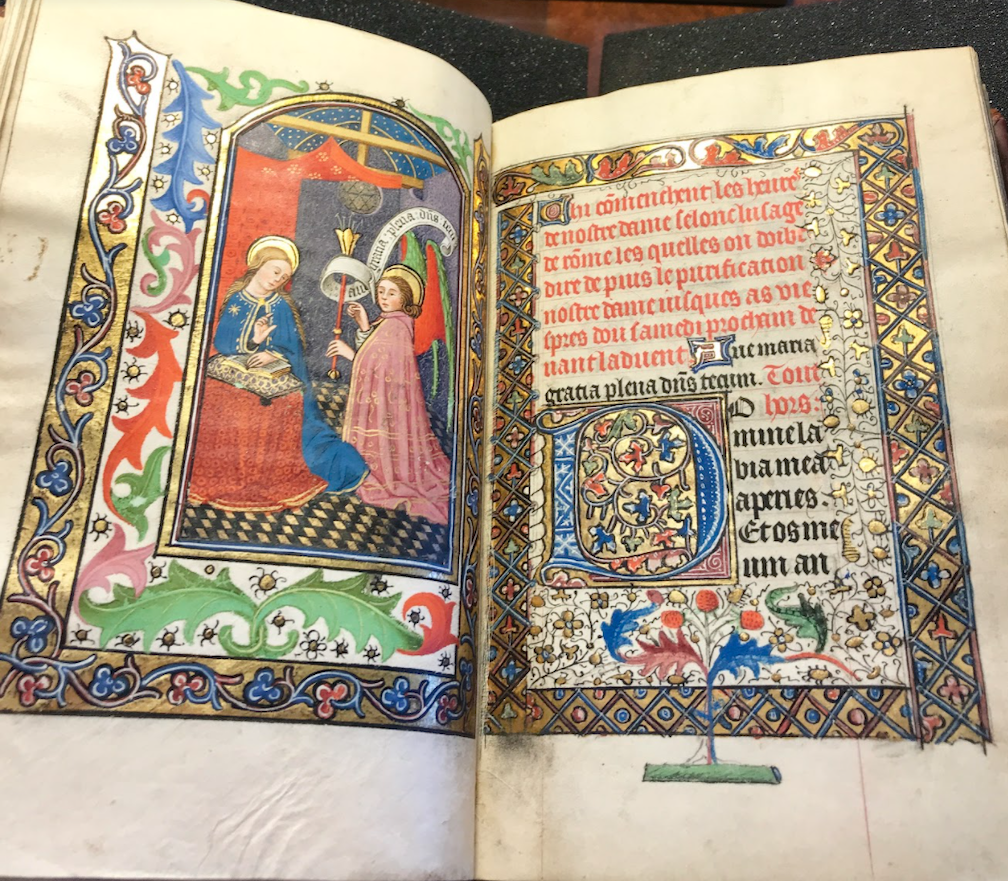 USC Illuminated Medieval Manuscripts
The USC Libraries' collection of Illuminated Medieval and Renaissance Manuscripts, Incunabula, and Rare books (at Doheny Memorial Library's Special Collections Department), includes 16 unique and invaluable illuminated medieval manuscripts, as well as 12 other medieval manuscripts, those with pen-flourished initials or borders and originating in Europe. A very large number of these manuscripts were acquired in the early-mid 20th century by the Hoose Library of Philosophy, and they are now located in our Special Collections Department. Nonetheless the existence, as well as the scope of these unique historical artifacts, has remained largely unknown by our USC community of scholars and students, as well as by researchers nationwide and worldwide.
USC Illuminated Medieval Manuscripts
The USC Libraries' collection of Illuminated Medieval and Renaissance Manuscripts, Incunabula, and Rare books (at Doheny Memorial Library's Special Collections Department), includes 16 unique and invaluable illuminated medieval manuscripts, as well as 12 other medieval manuscripts, those with pen-flourished initials or borders and originating in Europe. A very large number of these manuscripts were acquired in the early-mid 20th century by the Hoose Library of Philosophy, and they are now located in our Special Collections Department. Nonetheless the existence, as well as the scope of these unique historical artifacts, has remained largely unknown by our USC community of scholars and students, as well as by researchers nationwide and worldwide. -
 USC Digital Voltaire
This collection of letters constitutes for us, the foundation for an experimental librarian-led digital humanities project, with the initial goal to create a scholarly critical edition that could form a basis, as well as a set of best practices, for curated online projects on Voltaire’s epistolary manuscripts, located in so many other institutions’ Special Collections departments.
USC Digital Voltaire
This collection of letters constitutes for us, the foundation for an experimental librarian-led digital humanities project, with the initial goal to create a scholarly critical edition that could form a basis, as well as a set of best practices, for curated online projects on Voltaire’s epistolary manuscripts, located in so many other institutions’ Special Collections departments. -
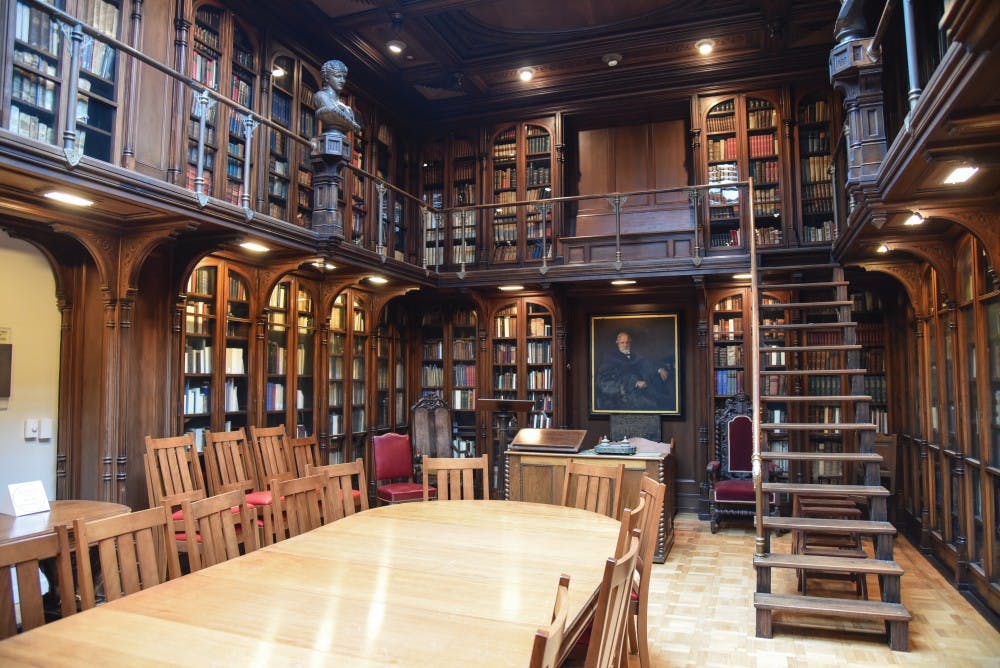 Kislak Center Medieval and Renaissance Manuscripts
The Kislak Center possesses over 1500 Western manuscript codices, collections, and fragments dating from ca. 850 to ca. 1700. The 2011 gift of the Lawrence J. Schoenberg Collection has greatly increased the breadth of Penn's holdings. Manuscript research is supported by the Schoenberg Institute for Manuscript Studies (SIMS). Nearly all of the medieval and early modern manuscripts held in the Kislak Center have been fully digitized and are available for viewing through multiple portals, without access restrictions. Searches may be refined by language, subject, date, collection, and other categories.
Kislak Center Medieval and Renaissance Manuscripts
The Kislak Center possesses over 1500 Western manuscript codices, collections, and fragments dating from ca. 850 to ca. 1700. The 2011 gift of the Lawrence J. Schoenberg Collection has greatly increased the breadth of Penn's holdings. Manuscript research is supported by the Schoenberg Institute for Manuscript Studies (SIMS). Nearly all of the medieval and early modern manuscripts held in the Kislak Center have been fully digitized and are available for viewing through multiple portals, without access restrictions. Searches may be refined by language, subject, date, collection, and other categories. -
 The Hannah Arendt Papers
The papers of author, educator, political philosopher, and public intellectual Hannah Arendt (1906-1975) constitute a large and diverse collection (25,000 items; 82,597 images) reflecting a complex career. The collection spans the years 1898 to 1977, with the bulk of the material beginning in 1948, three years before Arendt’s naturalization as an American citizen. The papers contain correspondence, articles, lectures, speeches, book manuscripts, transcripts of Adolf Eichmann’s trial proceedings, notes, printed matter pertaining to Arendt’s writings, family and personal materials, evidence of Arendt’s network of fellow intellectuals, editors, writers, and theorists, and documentation of her academic affiliations and courses taught. The collection was digitized in 1998-2000 through the generous support of the Andrew W. Mellon Foundation. Initially, some digital content was limited to onsite access through dedicated work stations available only at the Library of Congress, The New School in New York City, and the Hannah Arendt Center at the University of Oldenburg, Germany. This updated digital presentation of the Hannah Arendt Papers at the Library of Congress is now available publicly online in its entirety.
The Hannah Arendt Papers
The papers of author, educator, political philosopher, and public intellectual Hannah Arendt (1906-1975) constitute a large and diverse collection (25,000 items; 82,597 images) reflecting a complex career. The collection spans the years 1898 to 1977, with the bulk of the material beginning in 1948, three years before Arendt’s naturalization as an American citizen. The papers contain correspondence, articles, lectures, speeches, book manuscripts, transcripts of Adolf Eichmann’s trial proceedings, notes, printed matter pertaining to Arendt’s writings, family and personal materials, evidence of Arendt’s network of fellow intellectuals, editors, writers, and theorists, and documentation of her academic affiliations and courses taught. The collection was digitized in 1998-2000 through the generous support of the Andrew W. Mellon Foundation. Initially, some digital content was limited to onsite access through dedicated work stations available only at the Library of Congress, The New School in New York City, and the Hannah Arendt Center at the University of Oldenburg, Germany. This updated digital presentation of the Hannah Arendt Papers at the Library of Congress is now available publicly online in its entirety. -
Audio Archive
This website contains a variety of recordings, including alternative news programming, Grateful Dead concerts, Old Time Radio shows, book and poetry readings, and original music. You'll also find audio recordings, videos, pictures, and articles covering philosophers such as Aristotle, Hobbes, Plato, and more. -
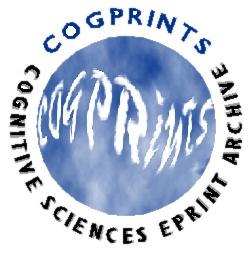 CogPrints
Welcome to CogPrints, an electronic archive for self-archive papers in any area of Psychology, Neuroscience, and Linguistics, and many areas of Computer Science (e.g., artificial intelligence, robotics, vison, learning, speech, neural networks), Philosophy (e.g., mind, language, knowledge, science, logic), Biology (e.g., ethology, behavioral ecology, sociobiology, behaviour genetics, evolutionary theory), Medicine (e.g., Psychiatry, Neurology, human genetics, Imaging), Anthropology (e.g., primatology, cognitive ethnology, archeology, paleontology), as well as any other portions of the physical, social and mathematical sciences that are pertinent to the study of cognition.
CogPrints
Welcome to CogPrints, an electronic archive for self-archive papers in any area of Psychology, Neuroscience, and Linguistics, and many areas of Computer Science (e.g., artificial intelligence, robotics, vison, learning, speech, neural networks), Philosophy (e.g., mind, language, knowledge, science, logic), Biology (e.g., ethology, behavioral ecology, sociobiology, behaviour genetics, evolutionary theory), Medicine (e.g., Psychiatry, Neurology, human genetics, Imaging), Anthropology (e.g., primatology, cognitive ethnology, archeology, paleontology), as well as any other portions of the physical, social and mathematical sciences that are pertinent to the study of cognition. -
PhiSci-Archive
Welcome to PhilSci-Archive, an electronic archive specifically tailored to and run by philosophers of science. The archive is offered as a free service to the philosophy of science community. Its goal is to promote communication in the field by the rapid dissemination of new work. We aim to provide a stable, openly accessible repository in which scholarly articles and monographs may find a permanent home. Works posted here can be linked to from across the web and freely viewed without the need for a user account. PhilSci-Archive invites submissions in all areas of philosophy of science, including general philosophy of science, philosophy of particular sciences (physics, biology, chemistry, psychology, etc.), feminist philosophy of science, socially relevant philosophy of science, history and philosophy of science and history of the philosophy of science. -
Internet Archive
Internet Archive is a non-profit library of millions of free books, movies, software, music, websites, and more.